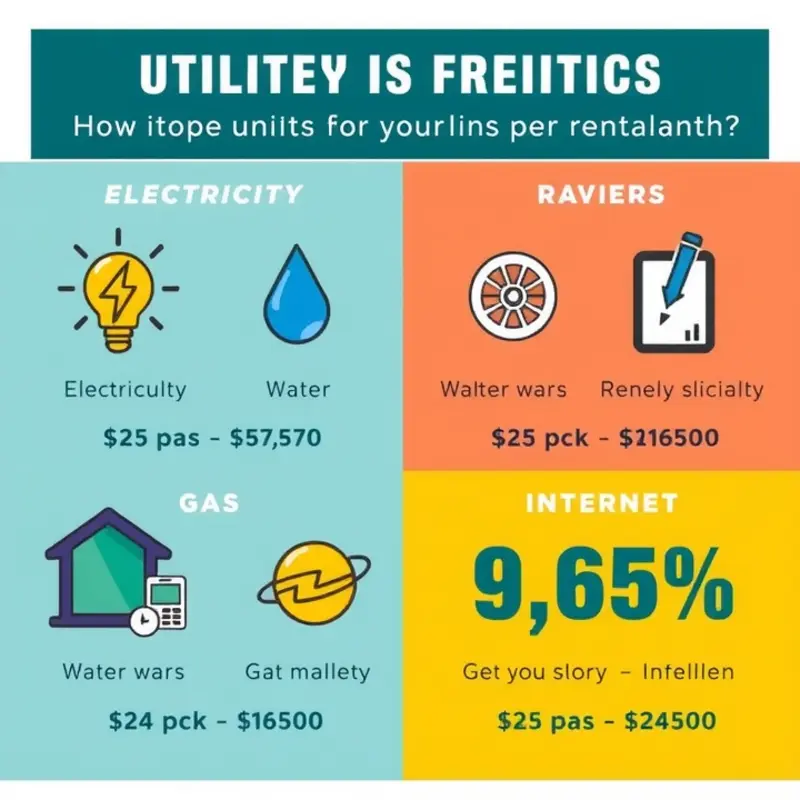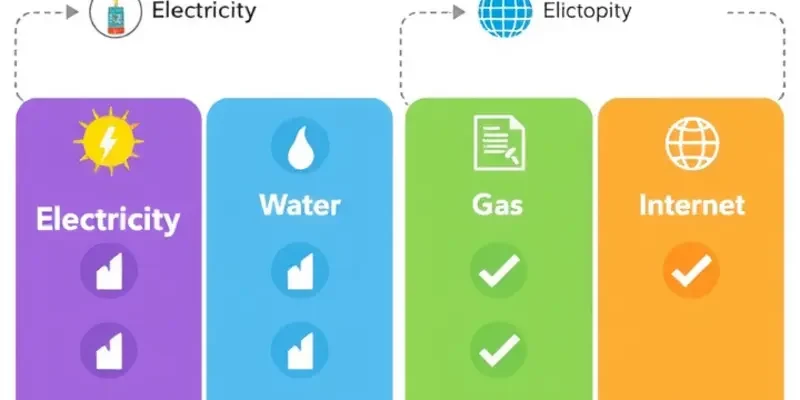Moving out on your own is like stepping onto a roller coaster for the first time: exhilarating, slightly scary, and full of twists and turns. As a new renter—whether you’re a young professional, a couple, or a family—you’re ready to embrace independence. However, there’s one thing that might make you sweat: utilities. From water to electricity to internet, understanding utility costs is essential for your financial health. And we all know that nothing kills the thrill of your first apartment quite like a surprise bill that could rival your rent. But fear not! We’re here to demystify the utility budget so you can enjoy your new digs without any unwelcome surprises. Let’s dive into smart budgeting tips that will keep you ahead of the game and your wallet happy.
Utility Essentials: Know What You’re Up Against

When stepping into the realm of renting, the myriad of utility costs can seem overwhelming. Understanding these essentials is paramount to manage your budget efficiently. Utilities commonly include electricity, gas, water and sewer, trash collection, and internet and cable. Knowing your responsibilities as a renter will equip you to estimate costs better and avoid surprises.
Electricity is often the most significant utility expense, especially if your home utilizes electric heating. To estimate your monthly bill, check if the rental has energy-efficient appliances, which can lower costs. Remember that seasons impact electricity usage; expect higher bills during winter or summer when heating or cooling demands peak. A cost-effective approach is to get usage data from previous tenants through the utility provider.
Gas is another energy utility frequently used for heating and cooking. Like electricity, gas bills fluctuate with seasons. Check whether your heating system and stove are gas-fueled. Depending on the region and building setup, your gas costs could vary significantly, so factor in these variables while budgeting.
Water and sewer services are essential utilities often provided by local municipalities. Typically, water costs are lower than energy utilities, but this depends on the number of occupants and usage patterns. If your rental includes laundry facilities, or if you plan to water gardens, anticipate an uptick in your water bill. Some landlords incorporate this expense into the rent, so it’s vital to clarify this at the lease signing.
Trash collection is another crucial service that renters might overlook. In some rental agreements, this is included, but it can also be billed separately. Understanding the frequency and coverage (e.g., regular garbage, recycling) helps in anticipating costs.
Finally, internet and cable can vary greatly based on preferences and providers. While not a traditional utility, these services are essential for many. Options range from basic internet plans to comprehensive bundles including phone services. Conducting a thorough comparison of provider plans will aid in selecting an affordable package.
To develop a holistic utility budget, seek advice from your leasing office or previous tenants. A detailed checklist for such inquiries can be found here. Additionally, online tools and calculators provide estimates based on regional averages, but always allocate a buffer in your budget for unforeseen increases.
Understanding and budgeting for utilities doesn’t need to be a daunting process. By dissecting these essentials and considering historical usage patterns, you can grasp a much clearer picture of what to expect. As you integrate these insights, you’ll confidently plan your expenses without unnecessary financial strain.
Crafting Your Utility Budget: Tips You Can’t Ignore

Creating a utility budget is crucial for any renter wanting to manage expenses effectively. Your utility costs can vary each month, so a well-thought-out plan helps maintain financial stability. Start by listing all utility services, such as electricity, water, gas, internet, and trash removal. This allows you to see the full scope of your potential expenses.
Once you identify the different utilities, research average costs in your area. For instance, ask neighbors or your landlord about typical utility bills or use online tools to gain estimates. Remember that utility rates can fluctuate based on usage and seasons. For example, electricity bills often rise in the summer due to air conditioning, while heating costs can spike during winter.
It’s wise to set aside a portion of your income specifically for utilities. Aim for 5-10% of your monthly income, depending on local rates and your lifestyle. If this amount feels high, consider where reductions are possible to avoid overspending.
To reduce utility costs, focus on energy efficiency. Replace incandescent bulbs with LED or CFL lights. Use a smart power strip to prevent phantom loads—electricity drawn by devices in standby mode. Regular maintenance of appliances and HVAC systems can also enhance efficiency, potentially lowering your bills.
Consider habits that save water, such as turning off the tap while brushing your teeth and promptly fixing any leaks. Install low-flow showerheads and faucet aerators to decrease water consumption without sacrificing comfort.
Incorporate internet-based strategies to save on your internet bill. Compare plans to ensure you’re not overpaying for speed you don’t need. Sometimes, bundling with other services can offer savings, but be cautious of contracts locking you into higher prices in the long term.
Leverage digital tools and apps to track your utility usage. These tools often provide alerts for unusual spikes in consumption, offering a chance to address issues before receiving a higher-than-expected bill.
Beyond managing current costs, it’s essential to review your current bills regularly. Subscribed to services you aren’t using? Cancel them. Are there charges you didn’t expect? Investigate immediately. A proactive approach keeps your budget intact.
Adapting your budget as circumstances change is vital. If you’re considering moving, checklist for renter’s insurance can offer peace of mind and highlight any utility prerequisites you’re liable for.
Mastering your utility budget isn’t about restriction—it’s empowering. It ensures clarity in your finances, preventing unnecessary stress. Equip yourself with these tactics and future utility bills will become just another routine, not a surprise.
Final words
Budgeting for utilities might not have the excitement of a new adventure, but it’s a crucial skill to ensure that your new renting experience stays enjoyable. By knowing what to expect and planning ahead, you can avoid any unpleasant financial surprises that threaten to derail your happiness. Remember to keep an ongoing record of your expenses, consult with your landlord for estimated costs, and look for opportunities to cut down on your usage. With a strong plan in place, you can rest easy knowing your utilities are well within budget, allowing you to focus on the fun parts of renting—like decorating the living room or hosting that long-awaited housewarming party. Embrace your independence with confidence!









